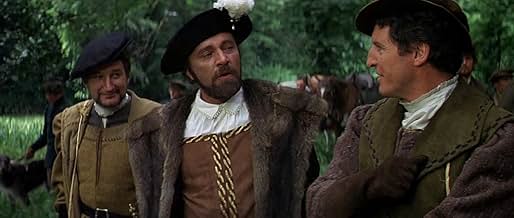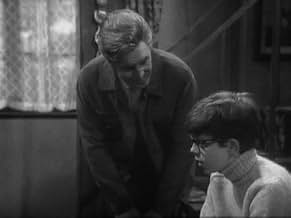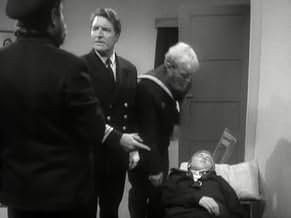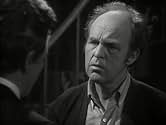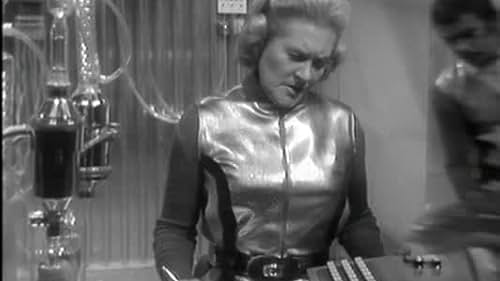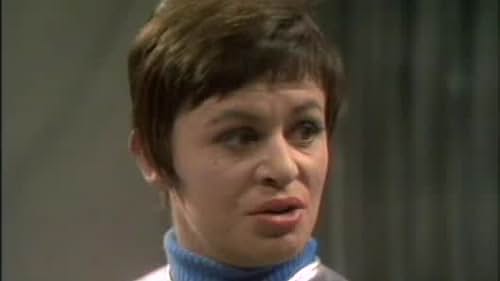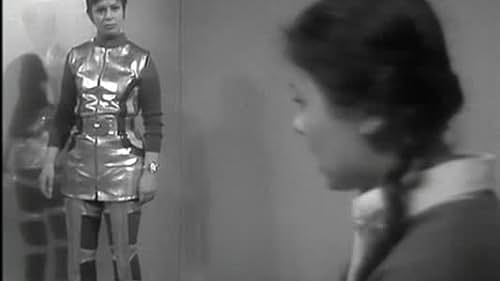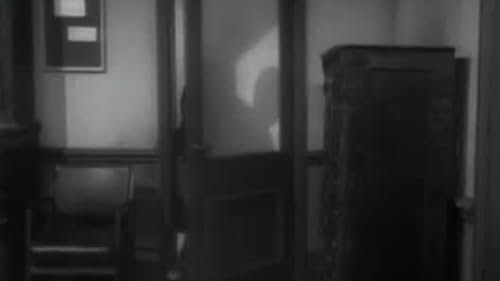Denis Quilley(1927-2003)
- Actor
Noted British classical theatre actor Denis Quilley distinguished himself on the Shakespearean stage alongside Laurence Olivier and
John Gielgud, among others. His sturdy handsomeness was slightly offset by a relatively prominent proboscis. As in the case of Jeremy Northam and Liam Neeson, it only accentuated his individuality and added a decided uniqueness of his characters.
Born in London on December 26, 1927, Denis was educated at Bancroft's School in Essex. He made his London debut stage appearance in 1945 with the Birmingham Repertory Company and replaced Richard Burton in "The Lady's Not for Burning" in 1950. He followed this with roles in Shakespeare's "Twelfth Night" and "The Merchant of Venice." Quilley then took a marked departure from his classical reputation and made a resounding hit for himself in musicals and satirical revues, notably "Airs on a Shoestring" (1953) and "Grab Me a Gondola."(1956). In the early 60s Denis took his London role in "Irma La Douce" to Broadway and was met with great success.
Over his nearly six-decade career, Quilley would grace the Old Vic, Royal Shakespeare, Regent's Park and Drury Lane stages in a wide range of roles. Highlights have included his Lopakhim in "The Cherry Orchard" and Claudius in "Hamlet." In the 70s he joined Laurence Olivier's National Theatre Company for its last seasons at the Old Vic. He played Jamie to Olivier's James Tyrone in "Long Day's Journey Into Night" (also a TV version), Hildy Johnson in "The Front Page" and Caliban in "The Tempest" with John Gielgud. He continued impressively in musicals winning kudos for his "Sweeney Todd" and for "La Cage Aux Folles."
In 1951, Quilley was introduced to TV, with guest parts on such series as "The Black Arrow," "The March of the Peasants," "Dancers in Mourning," "The Vise" and the "BBC Sunday Night Theatre" where he portrayed Bassanio in a production of "The Merchant of Venice." In 1957, he made an uncredited movie debut in the war drama The Betrayal (1957), but did not return until given a featured role in Life at the Top (1965). Other intermittent film supports would include Show Boat (1951), The Black Windmill (1974), two Hercule Poirot whodunnits (Murder on the Orient Express (1974) and Evil Under the Sun (1982)), Privates on Parade (1983), Memed My Hawk (1984), King David (1985), Foreign Body (1986), Mister Johnson (1990) and Storia di una capinera (1993).
A familiar face on television, Quilley co-starred in three short-lived series: the crimer Contrabandits (1967), the sci-fi tale Timeslip (1970) and another crime series You're on Your Own (1975). He also appeared in a number of important mini-series: Masada (1981), A.D. (1985), Murder of a Moderate Man (1985) and his last, Cleopatra (1999).
The versatile Quilley was a gifted, cerebral player who could display strength as well as vulnerability and weakness. He ended his career with the musical "Anything Goes" in 2003, the year of his death. He was survived by his actress wife Stella Quilley (nee Chapman), who died in 2007, and three children.
Born in London on December 26, 1927, Denis was educated at Bancroft's School in Essex. He made his London debut stage appearance in 1945 with the Birmingham Repertory Company and replaced Richard Burton in "The Lady's Not for Burning" in 1950. He followed this with roles in Shakespeare's "Twelfth Night" and "The Merchant of Venice." Quilley then took a marked departure from his classical reputation and made a resounding hit for himself in musicals and satirical revues, notably "Airs on a Shoestring" (1953) and "Grab Me a Gondola."(1956). In the early 60s Denis took his London role in "Irma La Douce" to Broadway and was met with great success.
Over his nearly six-decade career, Quilley would grace the Old Vic, Royal Shakespeare, Regent's Park and Drury Lane stages in a wide range of roles. Highlights have included his Lopakhim in "The Cherry Orchard" and Claudius in "Hamlet." In the 70s he joined Laurence Olivier's National Theatre Company for its last seasons at the Old Vic. He played Jamie to Olivier's James Tyrone in "Long Day's Journey Into Night" (also a TV version), Hildy Johnson in "The Front Page" and Caliban in "The Tempest" with John Gielgud. He continued impressively in musicals winning kudos for his "Sweeney Todd" and for "La Cage Aux Folles."
In 1951, Quilley was introduced to TV, with guest parts on such series as "The Black Arrow," "The March of the Peasants," "Dancers in Mourning," "The Vise" and the "BBC Sunday Night Theatre" where he portrayed Bassanio in a production of "The Merchant of Venice." In 1957, he made an uncredited movie debut in the war drama The Betrayal (1957), but did not return until given a featured role in Life at the Top (1965). Other intermittent film supports would include Show Boat (1951), The Black Windmill (1974), two Hercule Poirot whodunnits (Murder on the Orient Express (1974) and Evil Under the Sun (1982)), Privates on Parade (1983), Memed My Hawk (1984), King David (1985), Foreign Body (1986), Mister Johnson (1990) and Storia di una capinera (1993).
A familiar face on television, Quilley co-starred in three short-lived series: the crimer Contrabandits (1967), the sci-fi tale Timeslip (1970) and another crime series You're on Your Own (1975). He also appeared in a number of important mini-series: Masada (1981), A.D. (1985), Murder of a Moderate Man (1985) and his last, Cleopatra (1999).
The versatile Quilley was a gifted, cerebral player who could display strength as well as vulnerability and weakness. He ended his career with the musical "Anything Goes" in 2003, the year of his death. He was survived by his actress wife Stella Quilley (nee Chapman), who died in 2007, and three children.



